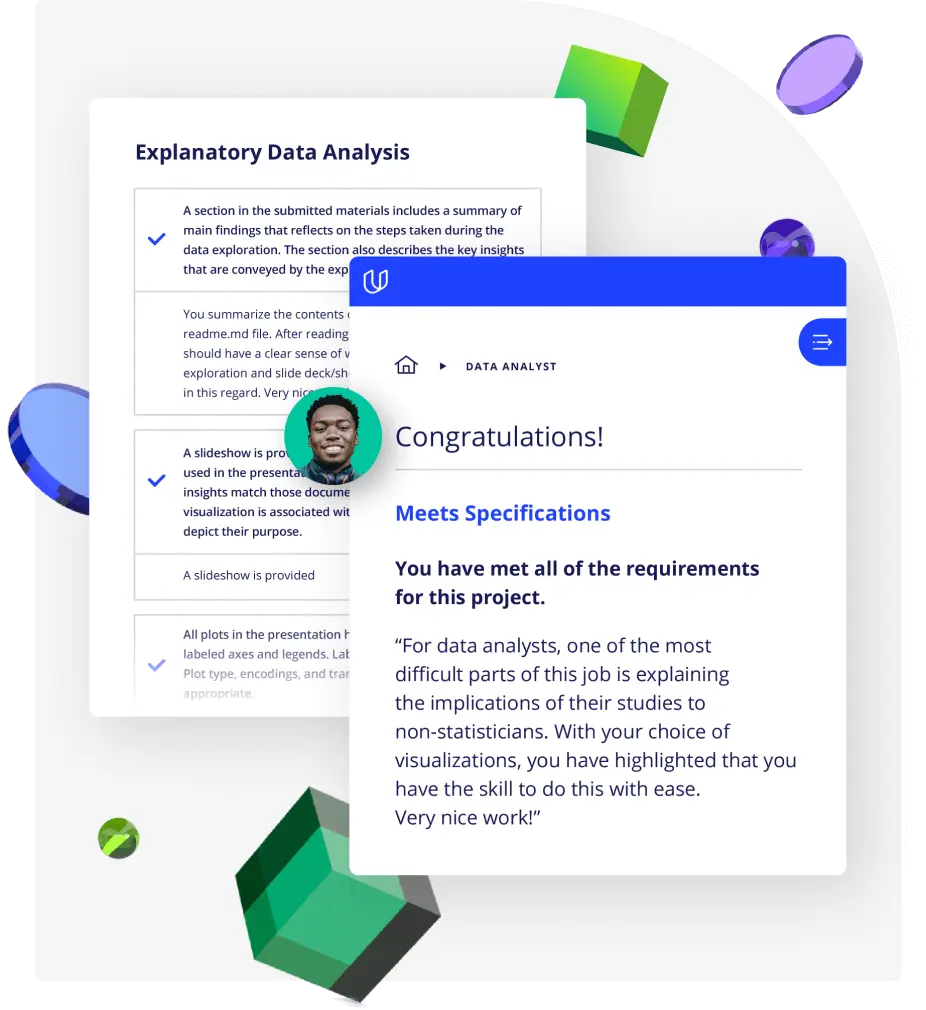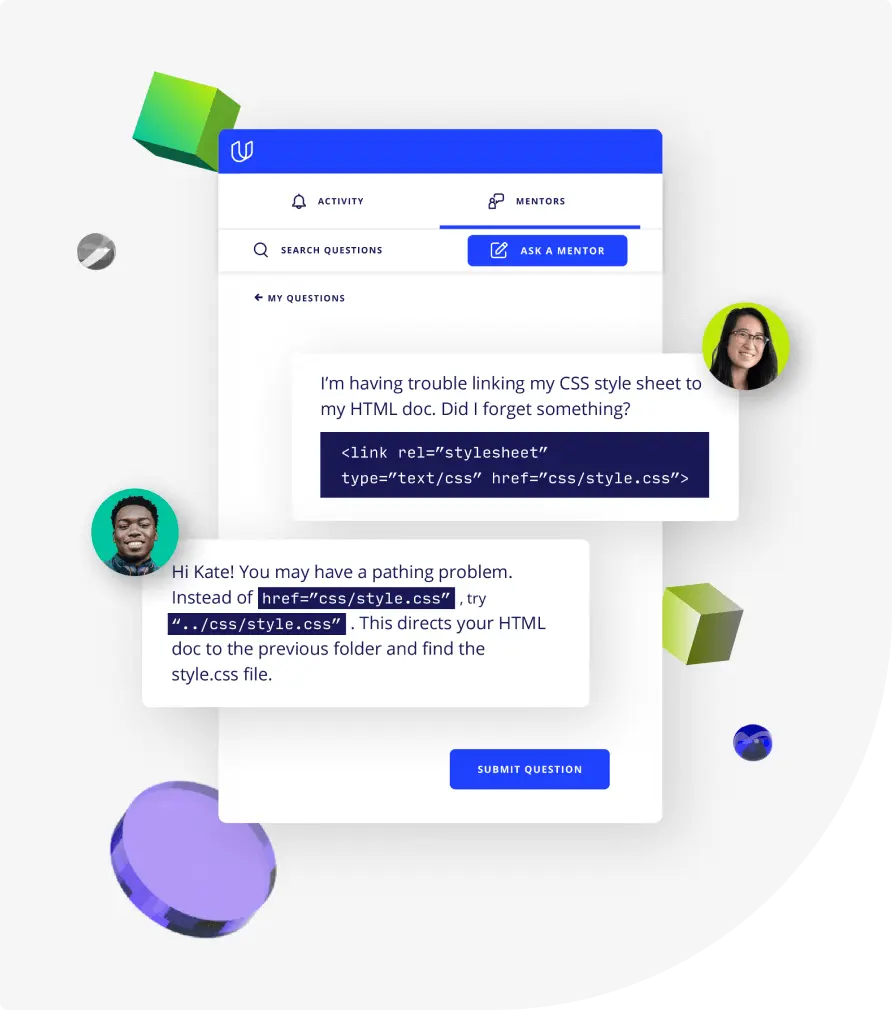Lesson 1
Welcome!
Welcome to Udacity. Takes 5 minutes to get familiar with Udacity courses and gain some tips to succeed in courses.

Nanodegree Program
In this program, you’ll develop the skills you need to join the rapidly growing cloud devops field.
In this program, you’ll develop the skills you need to join the rapidly growing cloud devops field.
Intermediate
4 months
Real-world Projects
Completion Certificate
Last Updated June 18, 2024
Skills you'll learn:
Prerequisites:
Course 1 • 45 minutes
Welcome to Udacity! We're excited to share more about your Nanodegree program and start this journey with you!
Lesson 1
Welcome to Udacity. Takes 5 minutes to get familiar with Udacity courses and gain some tips to succeed in courses.
Lesson 2
You are starting a challenging but rewarding journey! Take 5 minutes to read how to get help with projects and content.
Course 2 • 4 weeks
The cloud has become a key enabler for innovation with beneficial features like high availability, unlimited capacity, and on-demand scalability and elasticity. Learn the fundamentals of cloud computing while being introduced to compute power, security, storage, networking, messaging, and management services in the cloud. While learning the fundamentals, you will explore tools and services offered by Amazon Web Services(AWS) through interactive, hands-on exercises. By the end of the course, you will have deployed your first website to AWS.
Lesson 1
In this lesson, you will learn the basics of cloud computing including cloud deployment models, benefits, and popular AWS options.
Lesson 2
Learn why we need servers, compute power, and security.
Lesson 3
Learn why we need storage and content delivery in the cloud.
Lesson 4
Learn the importance of security in the cloud.
Lesson 5
Learn the basics of networking and elasticity in the cloud.
Lesson 6
Learn the basics of messaging and containers in the cloud.
Lesson 7
Learn why we need logging, auditing, and resource management in the cloud.
Lesson 8 • Project
In this project, you will deploy a static website to AWS.
Course 3 • 4 weeks
With the advent of cloud computing, along came several tools that enabled us to deploy the underlying infrastructure components that provide security and services to our servers by writing scripts. In this course, you’ll learn how to deploy this infrastructure using CloudFormation, AWS’ tool for Infrastructure as Code. You will use CloudFormation to deploy Infrastructure patterns that are used in the industry broadly and can be readily used to deploy any cloud application. Like in the real world, you will begin with initial business requirements that you will turn into Cloud Architecture Diagrams. Then you will deploy this architecture using CloudFormation.
Lesson 1
Set up the necessary tools to get started with AWS CloudFormation and deploy your first server.
Lesson 2
Convert business requirements into infrastructure diagrams and understand the principles behind design choices.
Lesson 3
Learn about various networking components that can be used in a VPC.
Lesson 4
Implement security groups and understand the concept of least-privilege as it applies to network traffic
Lesson 5
Deploy relational database and encryption service for your application.
Lesson 6 • Project
In this project, you’ll deploy web servers for a highly available web app using CloudFormation.
Course 4 • 4 weeks
This lesson will provide you with a comprehensive understanding of microservices architecture, containers, and Kubernetes in the context of AWS. You will learn how to build, deploy, and manage containerized applications at scale while utilizing AWS tools and services. By the end of your journey, you will have a strong foundation in containerization, microservices, and Kubernetes DevOps skills, enabling you to tackle real-world challenges in your professional career.
Lesson 1
Understand the concepts, skills, and goals you'll work through as well as prerequisites and tools to succeed in your learning journey.
Lesson 2
Dive into Docker containers and the Docker Engine and create, deploy, and manage containers. You'll learn about containerization, Docker images, Dockerfiles, and how to interact with AWS ECR.
Lesson 3
Understand the significance of microservices and how they affect the responsibilities of DevOps engineers. Learn about continuous integration and deployment and how to use AWS tools like CodeBuild.
Lesson 4
Use Kubernetes to solve the cumbersome overhead of managing microservices deployed with Docker. Learn the basics of Kubernetes including architecture, components, and key concepts.
Lesson 5
Extend your Kubernetes knowledge to applying cluster management to production workloads: Helm charts, logging, and scaling.
Lesson 6 • Project
Implement your understanding of Docker, ECR, CodeBuild, and Kubernetes to take an existing project into a production-ready Kubernetes environment in AWS

Data Platform Engineer
Justin Lee designs and builds modern scalable systems and consults for Fortune 500 companies. He currently works in the Silicon Valley as a platform engineer to enable users' data workflows. He has a BS in Computer Science from UCLA and is often mentoring and teaching developers through Codementor.

Chief Technology Officer
Byron is co-founder and Chief Technology Officer of Acklen Avenue, an agile software development company. Byron has been developing software since he was 9 years old, and is a true believer in anything that improves software maintainability, usability, and delivery.

Instructor
Kesha has over 20 years experience in software development and is a software engineering manager at Chick-fil-A, routinely leading innovation teams in proving out the use of cloud services to solve complex business problems. She was recently named an Alexa Champion by Amazon.

Instructor
Carlos is a Senior Solutions Architect at Infiniti Consulting where he helps institutions move traditional data centers to the cloud. He has worked for several large telecommunication providers managing and configuring network infrastructure, using Java, Groovy, Python, Perl, and PHP.
Average Rating: 4.6 Stars
416 Reviews
Leong M.
October 12, 2022
Feeling great! To be able to use some of the cloud computing services to deploy the application to the cloud!
Vinamra S.
June 29, 2022
Yes it has been awesome so far
John I.
March 13, 2022
Yes, This is good learning and well explained concept
Rafik F.
March 9, 2022
The program is going well!
Sahil S.
March 6, 2022
fast response
Combine technology training for employees with industry experts, mentors, and projects, for critical thinking that pushes innovation. Our proven upskilling system goes after success—relentlessly.

Demonstrate proficiency with practical projects
Projects are based on real-world scenarios and challenges, allowing you to apply the skills you learn to practical situations, while giving you real hands-on experience.
Gain proven experience
Retain knowledge longer
Apply new skills immediately

Top-tier services to ensure learner success
Reviewers provide timely and constructive feedback on your project submissions, highlighting areas of improvement and offering practical tips to enhance your work.
Get help from subject matter experts
Learn industry best practices
Gain valuable insights and improve your skills

Unlimited access to our top-rated courses
Real-world projects
Personalized project reviews
Program certificates
Proven career outcomes
Full Catalog Access
One subscription opens up this course and our entire catalog of projects and skills.
Average time to complete a Nanodegree program
(398)
3 months
, Intermediate
(62)
3 months
, Intermediate
(174)
2 months
, Advanced
(34)
4 months
, Intermediate
4 weeks
, Intermediate
(4)
3 months
, Advanced
(47)
4 months
, Intermediate
(2)
4 months
, Advanced
4 weeks
, Intermediate
(75)
4 months
, Intermediate
(449)
4 months
, Intermediate
(13)
4 weeks
, Beginner
4 weeks
, Intermediate
4 weeks
, Intermediate
(85)
3 months
, Intermediate
4 weeks
, Beginner

Cloud DevOps Engineer
(398)
3 months
, Intermediate
(62)
3 months
, Intermediate
(174)
2 months
, Advanced
(34)
4 months
, Intermediate
4 weeks
, Intermediate
(4)
3 months
, Advanced
(47)
4 months
, Intermediate
(2)
4 months
, Advanced
4 weeks
, Intermediate
(75)
4 months
, Intermediate
(449)
4 months
, Intermediate
(13)
4 weeks
, Beginner
4 weeks
, Intermediate
4 weeks
, Intermediate
(85)
3 months
, Intermediate
4 weeks
, Beginner